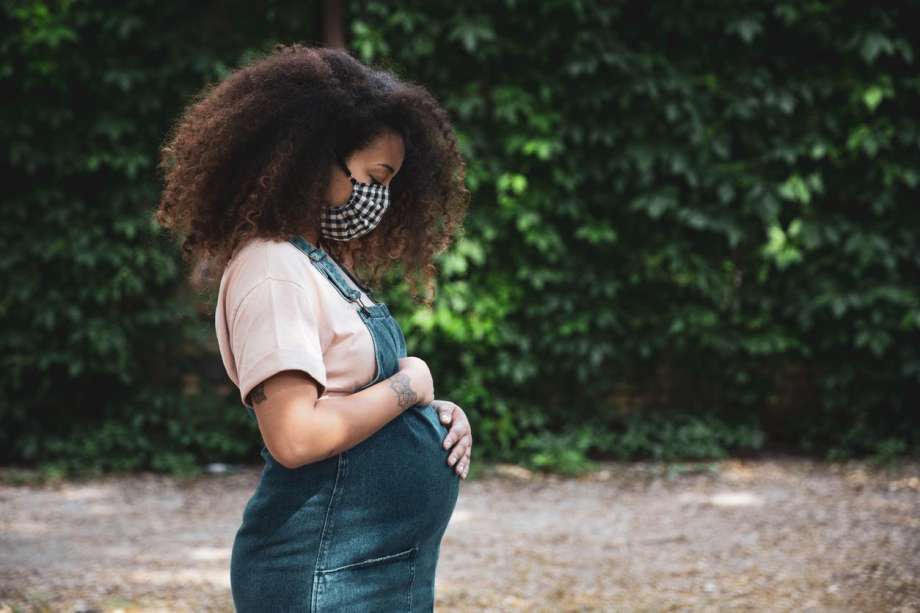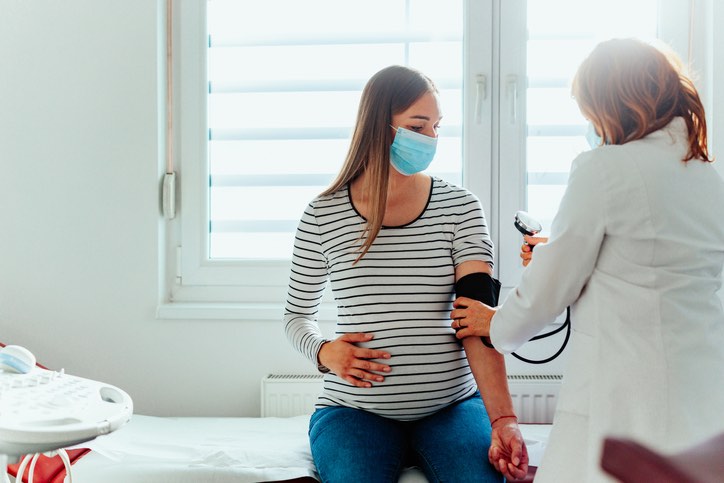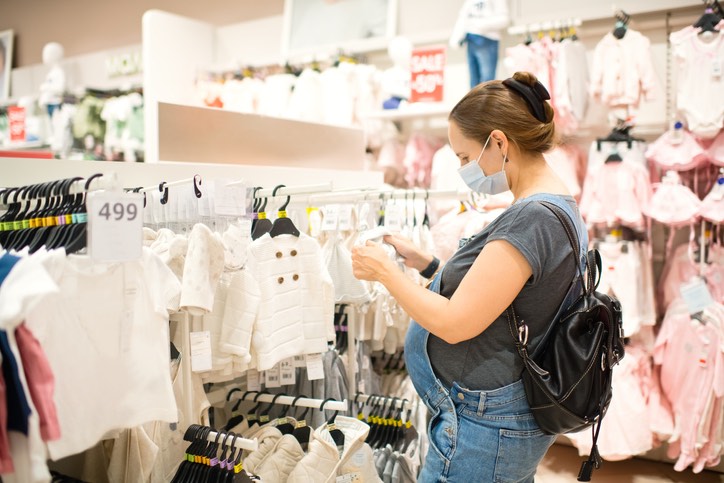Pandemic Pregnancy: A Guide to Winter 2022-2023

Remember when we thought the pandemic would only last for that mid-March two-week lockdown? Fast-forward two-plus years later and it’s pretty clear that the coronavirus isn’t going anywhere. We weathered through the pre-COVID-19 vaccine days, the Delta surge, and the ever-growing maze of Omicron letter-number combo variants and subvariants.
Now that we’re heading into the winter of 2022-2023 it’s time to prepare for what’s to come – especially if you’re pregnant. From how to handle healthcare visits to which U.S. Centers for Disease Control and Prevention (CDC) guidelines you need to follow this year, read on for all the information that soon-to-be moms (and their families) need to know about the pandemic, pregnancy, risk groups, vaccinations, and more.
Easy Steps for Winter Season Pregnancy Self-Care
The rates of COVID-19, the flu, RSV, and other respiratory illnesses peak during the wintertime.
Pregnant women are at an increased risk for complications from these common respiratory illnesses with a higher incidence of severe disease. Just knowing this can be overwhelming, but there are simple steps you can take to ensure your safety without having to lock yourself away.
Before the weather gets colder and the winter surge starts, you may need to learn more about pregnancy health care and how to manage the most brutal months of the year.
1. Talk to Your Healthcare Provider

Although being pregnant generally increases your risk of these winter illnesses, every pregnancy is different. If you are concerned about your specific risk, talk to your OB, nurse midwife, or another medical provider.
It’s important to see whichever specialist you are currently under for your pregnancy because this is the clinician that will best know you, your background, your health status, and therefore your risk. They can also explain simple facts about respiratory illnesses and their impact on high-risk pregnancies.
2. Get Vaccinated
When was the last time you got an mRNA COVID-19 vaccine or a flu vaccine? If the answer is never, you can’t remember, or you’re way overdue, now is the time to get vaccinated. While immunizations can’t provide 100 percent protection, the COVID-19 vaccine and influenza vaccine can significantly reduce the risks and the severity of respiratory illnesses.
There is also current research that suggests that a COVID-19 vaccine not only protects pregnant women from the illness but their unborn babies too.
Make sure you have the right number of total vaccine doses to protect you. Your healthcare provider should have a copy of your vaccination record.
3. Brush Up on Hand Hygiene
To prevent those pesky pandemic-related germs, the CDC.gov website recommends washing your hands for at least 20 seconds (with soap and running water) before touching your eyes, mouth, or nose, before/after preparing food, before/after eating, after using the restroom, after touching garbage, and while caring for someone who is currently sick. This type of infection prevention can reduce your risk of becoming unwell, and it is easy to instigate as a part of your daily routine.
4. Avoid Infected People, Where Possible
There is one way and one way only to get a COVID-19 infection, the flu, RSV, or another respiratory illness — exposure to the virus. The CDC website notes that coronavirus spreads via respiratory droplets from an infected person.
According to the American Heart Association, the cold weather alone won’t do the trick. But if the bitter cold forces you into indoor situations, close contact with carriers could put you at an increased risk for a severe illness. Don’t stress if you’re not sure about the epidemiology or public health issues behind the spread of disease. If you know someone who has COVID-19, keep clear of them for at least one week since they first noticed symptoms.
5. Wear the Right Kind of Face Mask

The CDC recommends wearing a face mask when the local Covid-19 Community Level reaches a high status. Pregnant women should wear masks in public indoor spaces when the level reaches medium, according to the CDC website’s guidelines. Information from the CDC or your local department of health can help you to determine the risk level in your area.
It’s important to wear a mask that will actually protect you. Make sure it covers both your nose andmouth and that the mask has a double layer of material.
6. Take Care of Your Mental Health
A high-risk status or a higher-risk pregnancy due to other medical conditions can take a toll on your mental health — especially if you’re worried about catching COVID-19, the flu, RSV, or another infection. If the winter weather and flu season concerns make you feel isolated, stressed, or anxious, healthcare providers can help. Your primary care doctor, OBGYN, or mental health professional can guide you through this tricky time and help you to find ways to relax.
FamilyEducation provides a complete, comprehensive guide to mental health and pregnancy. Following some of these simple steps may help you to feel more in control of your mental health. Don’t underestimate the impact your mental well-being can have on your physical health – our immune systems weaken during times of stress and make us more susceptible to illness.
7. Learn About Antiviral and Other FDA-Approved Interventions

Respiratory diseases typically run their course and you should begin to feel better within 1-2 weeks. In order to help yourself get through infection or illness and reduce your chance of becoming severely unwell with it, talk to your primary care physician or other health care provider when you become unwell, rather than waiting until it gets bad. They can give advice about antiviral medications to treat severe COVID-19 and seasonal influenza or the use of monoclonal antibody therapy.
You can also educate yourself on best practices for self-care if you become unwell. Don’t be a hero and try to get by without properly taking care of yourself – this could only set you back and increase your risk of developing any complications.
The Do's of Winter Season Pregnancy Self-Care
Now that you know more about the general steps to winter-time pregnancy self-care success, it’s time to elaborate and get into some specifics.
1. Do Understand Your Risk Level
Infectious diseases vary between regions, seasons, and groups of people. The CDC considers pregnancy a risk factor for severe COVID-19 illness and hospitalization, admission to an ICU, and the potential need for a ventilator.
Along with pregnancy in general, some other underlying medical conditions (such as chronic lung disease, chronic kidney disease, certain respiratory diseases, certain types of heart conditions, and more) can raise the risk of severe disease. Frontline health services and healthcare workers and people who work with or live in a community with a high number of COVID-19 cases or a low COVID-19 vaccination rate are also at risk.
If you want to understand the rate of COVID-19 infection in your specific area, you can use this COVID-19 data tracker to gain information by entering your state.
2. Do Understand What Exposure Means
Again, coming into close contact with COVID-19, the flu, RSV, a cold, or another respiratory disease is the reason why people get sick. The factors affecting the transmission of COVID-19 (and many other respiratory viruses) include
- The length of the exposure time
- Whether the infected person was coughing/singing/shouting/breathing heavily near you
- Whether the infected person was symptomatic at the time of the exposure
- Whether masks were worn, and what types
- What the ventilation was like
- What the physical distance was between you and the infected person. The medical advice is to remain 2 meters apart, so if the distance between yourself and the infected person was less than that, you would be considered to have been in close contact with them.
3. Do Create a Balance Between Avoiding Exposure and Protecting Your Mental Health
With the CDC’s exposure explanation in hand, you’re ready to avoid potentially risky situations. Factor community spreads risk levels into your decision-making processes. This means you may want to gracefully bow out of that over-packed-with-people work party, choose outdoor activities over indoor events, or maintain your distance from other people in crowded areas.
But at the end of the day, who and what you avoid is up to you. It’s a balancing act between living your life and remaining emotionally well and avoiding unnecessary exposure.
Ultimately, you know your body best and how you want to play it when it comes to exposure. It’s important that whatever plan you make supports both your physical and emotional well-being. Being stuck at home all day might protect you from the germs outside, but it might not be great for your mental health.
Your loved ones can help you find a routine and a balance that will work for your coming months of pregnancy, and you can use COVId-19 and flu rates to help guide you and make sensible decisions.
4. Do Rely on Facts, Not Fiction When it Comes to Vaccinations

Forget about what you’ve read on social media and look to the CDC, FDA, or other trusted organization for a FAQ list on the COVID-19 vaccine. An unvaccinated pregnant person with certain health conditions is at a higher risk level.
The CDC recommends that everyone stays ‘up to date’ on their COVID-19 vaccines. For adults ages 18 and older this includes either an initial two-shot series of the Moderna or Pfizer mRNA vaccines or in certain situations, the J&J single shot.
The updated bivalent booster that also protects against the Omicron variant is available from either Moderna or Pfizer. Previous booster doses do not protect against the Omicron strain.
Along with the COVID-19 vaccine, you may also need an immunization to protect you from seasonal influenza. The flu vaccine is a yearly shot. The CDC notes that the seasonal flu shot is safe for pregnant women (provided you don’t have an allergy to one of the components). But pregnant people should not get the live attenuated nasal spray vaccine.
The Don'ts of Winter Season Pregnancy Self-Care
1. Don't Skip Your Prenatal Appointments for Fear of Infection
Prenatal health care visits are always important, regardless of the season. If you have concerns about going into a crowded doctor’s office, ask your healthcare provider about the possibility of a telehealth appointment, or try asking the surgery what time their peak busy hours are to help you coordinate the best time for your appointment.
2. Don't Assume You Know What You Have
Even though home COVID-19 tests are easy to use and can help to spot a current infection, your healthcare provider may want you to get a PCR test to rule out a potential false negative (and prevent a public health problem). It’s important to use testing services and advice from doctors to determine what illness you have so that you can assess the risk to yourself and your baby.
3. Don't Worry About Asking for Help!
You don’t have to do it all. There is no first-place ribbon for the pregnant mama who tackles all three trimesters by herself. If your other kiddos are sick or you just need a mental health day, ask your spouse, partner, parents, BFF, or any other trusted adult to care for them. Winter is a difficult time for pregnant women, and you deserve to be taken care of!

